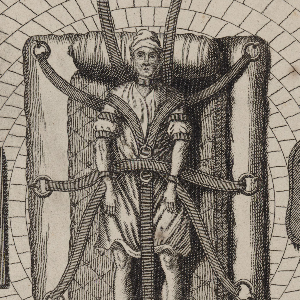Law

French Constitution, Rights of Man and Citizen
This image of the Declaration of Rights of Man and Citizen includes a fascinating mix of symbols. By arranging the articles on tablets, the artist clearly meant to associate this document with Moses’ Ten Commandments.

Removal of the Parlements
The French Revolutionary engraving's depiction of the physical eviction of the black–robed magistrates in front of a female audience has a somewhat ambiguous message.

Damiens Being Broken on the Wheel
This straightforward representation of Damiens gives no hint of sympathy for a would–be pre-revolutionary royal assassin.
Moreau, "On the Origins of the French Monarchy"
Jacob–Nicolas Moreau wrote this excerpt as part of his Lessons of Morality, Politics and Law (1773) at the request of the aging Louis XV for the instruction of the Dauphin. Throughout the 200–page book, Moreau defends the power of the King to rule France without opposition.
Bossuet, "The Nature and Properties of Royal Authority"
Jacques–Benigne Bossuet (1627—1704), bishop of Meaux, was a well–known seventeenth–century peacher who believed that although France had a sizable minority of Protestants, France should have a single religion, Catholicism.
Letter from a Birmingham Jail
Martin Luther King Jr. wrote his "Letter from a Birmingham Jail" on April 16, 1963 as a response to a letter titled "A Call for Unity" which was written 4 days prior. "A Call for Unity" was signed by eight white clergymen who led churches in Birmingham, Alabama.
Short Teaching Module: Women in Classical Athens and Sparta
Primary texts about women in classical Athens and Sparta provide an excellent, if extreme, example of one of the main themes in the 100-level “World History to 1500.” This theme is the relationship between social structure and political institutions.
Life of Lycurgus
Part of Plutarch's Parallel Lives, Life of Lycurgus, is a collection of anecdotes on the Spartan law-giver, Lycurgus, that provides valuable information about the laws and customs of the Greek city-state.
On the Murder of Eratosthenes
In this speech, an Athenian man, Euphiletos, defends himself against a murder accusation, claiming that his killing of his wife’s lover was justifiable homicide.
Le Chapelier Law
In the spring of 1791, as the National Assembly worked on political and social reforms, workers in Paris took economic matters into their own hands by staging a series of strikes and demonstrations against their employers.